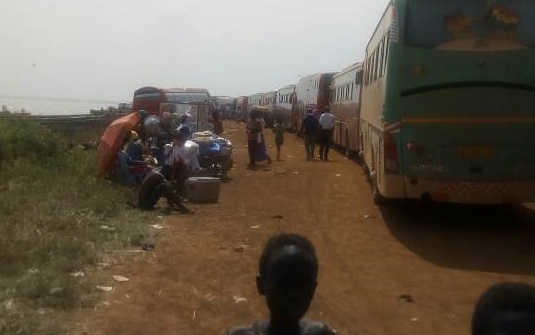
A transportation crisis has hit the Northern region after two major freeway bridges were simultaneously shut down five days ago, causing massive gridlock and devastating trade activities in the country’s largest region.
The bridges which carry more than 10,000 cars a day are major arteries for northern Ghana and a viable thoroughfare for traffic heading south to north, were closed to traffic in either direction for third maintenance works since this year.
The Buipe and Yapei bridges built over the White and Black Volta rivers is also an interstate highway linking the country to its neighboring states such as Mali, Niger and Burkina Faso where millions of cedis in trade of goods and services are exchanged daily.
It was closed on Tuesday, 21 October, 2017 by Roads and Highways Minister, Kwesi Amoako Atta for repairs at a cost of GH¢4m after it underwent similar purpose just in February and May at GH¢449,000 and GH¢420,000 respectively.
The minister who announced the immediate closure of the bridges said a sag and deep cracks have been created in the middle of the bridges which were very dangerous and posed serious threat to commuters. A month period has been set aside for the damage works and the Minister warned all motorist to stay off the over 238m long bridges.
Speaking to reporters, the minister described the state of the bridge as “scary, frightening” and said government was being proactive to prevent disaster. He acknowledged the inconveniences caused by the closure but called for road users’ collaborations.
“I want to appeal to our Northern brothers who regularly use this bridges, it’s going to create problems for the one month or so with great inconveniences to them. I want to appeal with them on behalf of the President and his government to bear it with us and as I said, everything would be done to make sure we do what is right to replace these bridges. What we have seen is very scary, it’s frightening and we must not sit down for any disaster to strike this country”.
However, nearly a week after the closure, engineers are not on site and there are no signs of works ongoing, leaving dozens of commuters stranded.
The closure which has effectively put a cork in the bottle, unleashed unprecedented sufferings on road users as they scrambled to find alternative routes through Eastern, Central and Western corridors of the country.
Thousands of passengers with hundreds of vehicles loaded also with goods who used to ply their trade with ease are currently stuck on the alternative routes with no hope when to arrive at their destinations.
Heavy trucks carrying goods from the port to factories and commercial stores in Northern Ghana and neighbouring countries are stranded around Yeji and Makango as they tried to make their journey through the Central corridor and scores of those who attempted a passing through the Eastern corridor have been left in desperate situations around Jasican and Oti Damanko.
There are reports of millions of goods on its way to destinations locked up and perishing and ambulance and referral services to the Northern regional capital grounded.
Only one ferry is currently operational on waters between Yeji and Makango on the Central route and authorities have called for deployment of more ferries to defuse a growing standoff between heavy trucks drivers and security forces as they accused the security of only allowing passage of passenger vehicles.
On average, the ferry takes two hours to cross and drivers who spoke to StarrNews said they had queued along the banks for several hours and days waiting to be ferried across.
For passengers, the situation keeps getting worse as most transport service providers including the Intercity State Transport Company have suspended operations and closed their regional terminals.
Hundreds of buses have canceled schedules and there is little increase in domestic air flight.
Passengers traveling within the country now have to walk many meters to join vehicles stationed at both end of the bridges. The travelers have accused the District Security Council of mounting blocks to take monies and allow passage to vehicles since the engineers were yet to commence the repairs.



